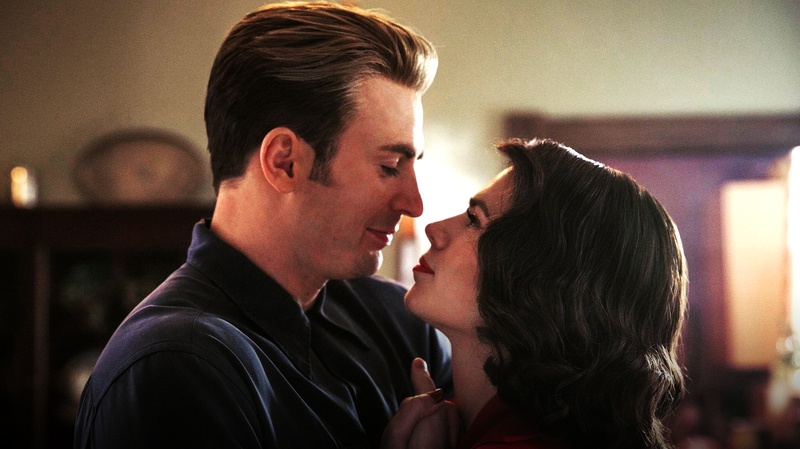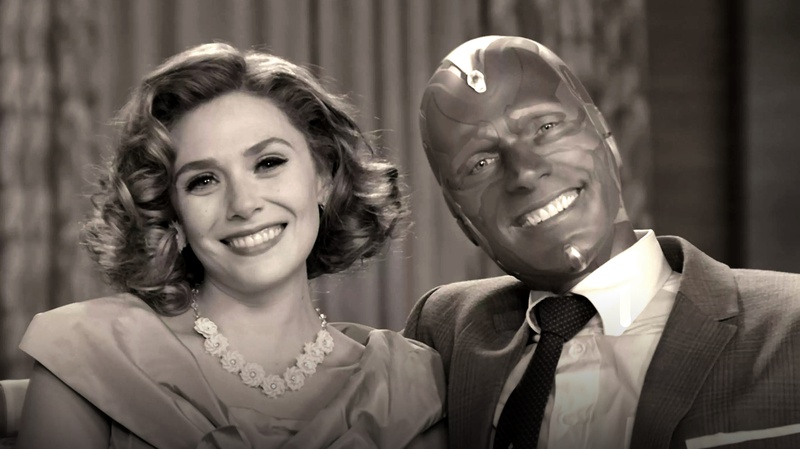Why Marvel Studios & DC Are Reincarnating So Many Superhero Romances

There’s a trope that’s becoming somewhat common in superhero media lately, the revived romance. One member of a couple dies (usually in battle or some other heroic manner) and the relationship is seemingly doomed forever; but down the line, the survivor finds a way to reunite with their dead lover via some sort of supernatural or science fiction based means.
The three most prominent examples of this in recent memory are Avengers: Endgame, Wonder Woman 1984, and the upcoming Disney+ series WandaVision. There has been much debate over the former two, so let’s take a look at what has fans so torn about those revived romances, and why WandaVision’s could very well prove to be just as divisive.
Steve Rogers and Peggy Carter — Avengers: Endgame

It’s hard to believe we’re about to have our third major revived onscreen superhero romance and it hasn’t even been two years since the first. Avengers: Endgame ended with Steve Rogers creating a branched timeline from that of the main MCU to reunite with Peggy Carter in the late 1940’s and live out his life with his dearly beloved.
Compared to the next case we’ll be diving into, Endgame doesn’t spend too much time on this particular plot point. Rather, it’s treated as the culmination of the decade-or-so spent by Steve in the present, after sacrificing himself in the 1940’s during Captain America: The First Avenger.
This move was an attempt by Rogers to move on from the past — and Peggy — and find his place in the world he wound up in. There is also a particular emphasis the previous MCU movies — particularly in Avengers: Age of Ultron — puts on Steve being unable to move on from his focus of war and fighting, for justice in general, regardless of where (or when) he is.
His return to Peggy is presented a reward for Steve, after he sacrificed so much, and worked so hard to protect. It also serves as his way of paying tribute to the late Tony Stark, who fought so that everyone — including himself and the rest of the Avengers — could live happily post-Endgame. Lastly it's a call back of the promise of the “rain check for that dance” between the two at the end of The First Avenger.
But this ending left a lot to be desired in terms of answers, even from those who were big fans of the reunion. For one thing, creating a branched timeline and leaving it as such (as opposed to the ones made during the time heist, which were closed off when the Infinity Stones were returned to them) is cautioned against earlier in the film as dangerous.
For another, we don’t know if Peggy was informed of the circumstances of Steve’s return, or if she knows what her potential life would have been like had he not gone back to her. It’s all very one-sided on the part of Steve, which is a shame considering Peggy is a great MCU character in her own right, and it doesn't feel right to see her presented as nothing more than a prize for someone else’s heroics.
It also raises a lot of questions about what we as the viewers are supposed to take away from Steve’s story. It seems that the message of his arc is that there’s more to life than saving the day for everyone else. But having him return to the past rather than move on in the present seems like the opposite of growth. A middle ground could have been Steve going back to get a 1940s Peggy and bringing her into the future with him, provided she was informed and involved in the decision; though that would still result in issues involving messing with time.
Something suiting to the spirit of the rest of Endgame would have been the two of them having their dance in Peggy’s office in the 1970’s (in a moment akin to Thor’s with his mother and Tony’s with his father), giving Steve some much-needed closure on the matter. Yes, Peggy was married then, but it would just be a dance! Though, this scenario would still require the filmmakers to come up with a different ending for Steve.
The Steve and Peggy reunion in Avengers: Endgame was meant to be a fairytale moment that probably wasn’t supposed to raise as many questions as it did. It’s a shame that the filmmakers weren’t particularly interested in providing some much-desired clarity on the subject (at least, not within the film itself); but luckily, those working on future projects employing this trope were.
Diana Prince and Steve Trevor - Wonder Woman 1984

This isn’t only our second revived romance, but our second to have originally met its ill-fated end during a World War, via a guy named Steve sacrificing himself. The similarities though start and end pretty much there. In many way Wonder Woman 1984’s version of the trope is opposite to Avengers: Endgame’s.
When Diana makes her wish for Steve to come back, it’s him that is zapped into 1984 — the present era in the movie — rather than her being sent back to 1918. We see her explain the situation to him almost immediately, and the two discuss the prospect of Diana renouncing her wish before she does so.
Diana’s character arc in this movie is learning to let go of the past (specifically Steve) so she can live up to her full potential. The “price” of her wish is the gradual loss of her superpowers, meaning she must renounce it in order to save the world. Of course, this stands in contrast to what happened in Endgame, with Steve Rogers and Peggy Carter.
WW84 makes a point to address Diana being stuck on the memory of Steve as something that’s holding her back. Rather than their reunion being a reward for her good deeds, reviving a past relationship instead of working to build something new is presented as a shortcut to happiness, and one with serious consequences.
The film also neglects to touch on a few of the more questionable elements of Steve’s revival, namely that when he does come back, he takes over the body of another man. The creative decision to have this be the method of his return turns out to be unnecessary to the overall plot of the film. They easily could have just had Steve return in his own body and little would change. If the filmmakers insisted on including this small detail, they should have tackled the moral dilemma of Steve taking over someone else’s body and life be part be integral to the plot.
Beyond the uncomfortable and unnecessary element of body possession, Wonder Woman 1984 does a pretty good job including and exploring the reunion between its romantic leads. While it seems out of character for Diana Prince to have spent so many decades pining over a man she spent a relatively short amount of time with. The story of learning to let go and move on in order to be your best self makes for an interesting and emotional take on the revived romance.
Wanda Maximoff and Vision — WandaVision

The revived romance was a footnote in Avengers: Endgame, a plot point in Wonder Woman 1984, and now it looks as though it’s going to be the main storyline in WandaVision. With this fans can expect a much deeper look into Wanda Maximoff and Vision’s relationship, than either of the two aforementioned revived romances. That level of focus will be much-needed. Unlike the other two love stories, no movie has had Wanda and Vision as the main characters.
In Avengers: Infinity War Vision is killed (twice): first by Wanda herself in order to save the Mind Stone from being taken by Thanos, and then by the Mad Titan himself after he rewinds time returning the stone to Vision’s head and taking it to complete the Infinity Gauntlet. Unlike those who were killed in the Snap (like Wanda), Vision does not return in Avengers: Endgame, but in WandaVision he is clearly alive and present.
This of course is because the Disney+ series doesn’t feature the same Vision who died in Wakanda, but one created by Wanda as part of an alternate world allowing her to live out her ideal life with him. It’s clear from the trailers that things aren’t as perfect as they seem at first glance, and there may be grave consequences to Wanda’s use of her powers in this manner.
Based on the way things appear to be heading in WandaVision, and the fact that only Elizabeth Olsen and not Paul Bettany has been announced as part of the Doctor Strange in the Multiverse of Madness cast, it is likely that this revived romance will come to an ill-fated end by the time the series wraps up. Something about the seemingly consuming nature of this alternate reality will have strong negative effects of some sort on its inhabitant and the outside world, and Wanda will ultimately be forced to give it up for the greater good, à la Diana Prince having to let Steve Trevor go in Wonder Woman 1984.
However, this story takes place within the Marvel Cinematic Universe (or is it a multiverse now?) the same one in which Steve Rogers messing with the delicate nature of time travel to get his happy ending with Peggy Carter has been presented as a positive thing. So WandaVision is going to have to work very hard to justify to its audience why that version of a revived romance is considered a-okay but the one Wanda has manifested is not.
It’s going to be an especially tricky task as the classic sitcom elements of WandaVision seem to be presenting the idea of nostalgia being dangerous to wallow in, while we’ve already seen Steve dive right into his own nostalgia and choose to live in it permanently. What exactly is it about Wanda’s trip down memory lane — or her powers that manifest her own personal paradise — that’s so dangerous in comparison? There will be plenty of time for this question to be addressed considering this appears to be the main focus of the series. We will have to see how Marvel handles this revived romance as the story of WandaVision unfolds.

No comments: